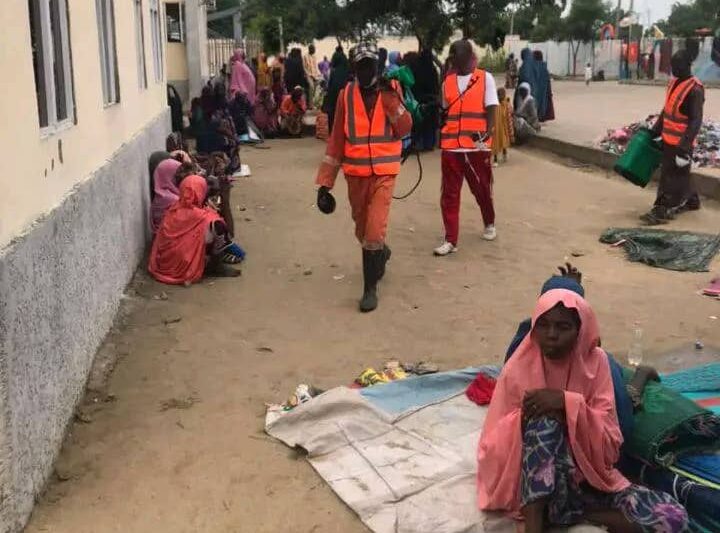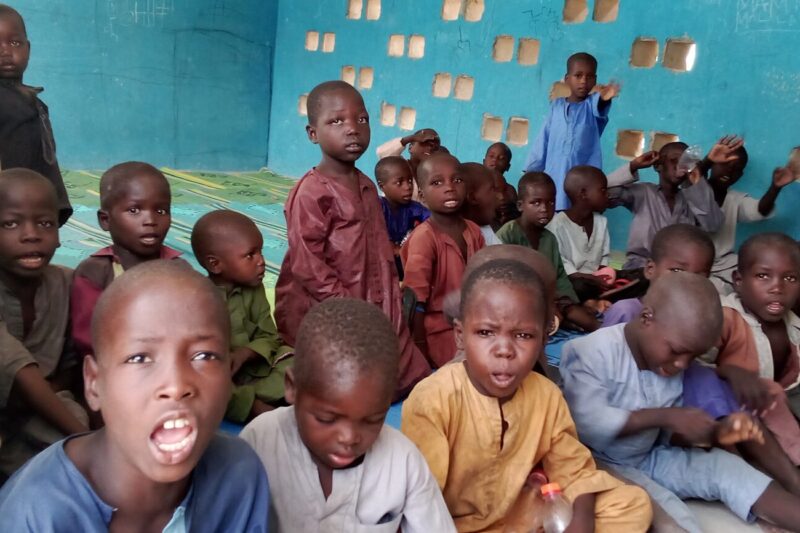Open defecation in displaced persons’ camps – where toilet facilities were washed away in the devastating September 10 flood – is the number one concern as more children fall ill every day.
The United Nations Children’s Fund (UNICEF) has donated just over ₦113 million – US$69,000 – in medical supplies to the Borno State government to try to help stem a cholera outbreak in the aftermath of the devastating September 10 flood.
The Borno State government said on Friday, October 4, that 17 cases of cholera had been confirmed but there were more than 450 suspected cases, mostly in the Maiduguri Metropolitan Council (MMC) and the local government areas of Jere, Konduga, Mafa and Monguno. No deaths have been reported.
Residents of Borno State believe there are far more cases of cholera, particularly in internally displaced persons’ camps where already inadequate toilet facilities were washed away in the flood which began in the early hours of Tuesday, September 10 when the Alau Dam overflowed.
As many as two million people were affected. More than 400,000 people in Maiduguri and its enviorns were displaced. The death toll has not been released.
Dr Rownak Khan, UNICEF’s deputy representative in Nigeria, handed over 40 Acute Watery Diarrhoea kits (90 units) and 50 cholera beds, as well as other medical supplies, to the Borno State Ministry of Health on Tuesday, October 8, in Maiduguri.
Khan said UNICEF was committed to helping the Nigerian government – particularly Borno State – to prevent and protect victims of cholera.
The agency’s comprehensive response focused not only on case management but also on preventive measures such as hygiene promotion, chlorination of water sources and emergency latrine construction.
She said UNICEF had delivered and administered 300,000 doses of the oral cholera vaccine targeting about 290,000 individuals. More than 650,000 vaccines were expected in the coming days which would reach half a million people.
“UNICEF’s response also involves large-scale activities aimed at prevention and case management, these include hygiene promotion, water supply, sanitation measures and vaccination.
“More than 13,750 people in Bakassi, Teachers’ Village, the Yerwa Government Girls Secondary School and the Gubio Road temporary internally displaced persons’ camps have benefited from the installation of 245 emergency latrines, with an additional 30 latrines under construction in Gubio Road IDP Camp.
“In terms of hygiene, UNICEF has distributed more than 4,400 hygiene and cholera kits to households, reaching 28,243 individuals.
“Safe water supply has been provided to 43,689 people across multiple displaced persons’ camps, supported by emergency water trucking and borehole rehabilitation.”
The Borno State government said it had received 300,000 doses of oral cholera vaccines from the Federal Ministry of Health, which had been “strategically distributed to health practitioners, displaced persons’ camps and flood-affected communities”.
Goni Imam Ali, the state’s director of public health, told RNI that the government was not neglecting anyone. Its aim was to provide cholera vaccines to all individuals who were affected by the flood.
“We know there are high-risk communities, especially in unofficial community IDP camps in Muna, Gwange and other areas of Maiduguri and its environs. We have already started reaching out to those communities by creating awareness on the dangers of cholera, including the signs and symptoms.
“Residents have been urged to report any suspected cases of cholera immediately.
“When we started distributing the oral cholera vaccines, we initially prioritised the areas affected by the flood – particularly victims taking refuge at temporary camps set up in the city and its environs to accommodate displaced persons. Now, we have started distributing to others, including unofficial IDP camps and their host communities.
“We are expecting more doses from the Federal Ministry of Health and humanitarian agencies, such as the World Health Organisation [WHO] and the United Nations Children’s Fund [UNICEF], so that we can roll out the vaccine campaign to all the citizenry of Borno State.”
Ali urged people to exercise patience, saying the government was waiting for supplies from the Federal Ministry of Health.
“As soon as we get supplies, we will distribute them to all vulnerable communities.
“We are aware of the shortage of vaccines. We have only a few remaining from the first supply we received. But the good news is that in less than three days we are expecting another big supply and we will prioritise vulnerable communities, unofficial IDP camps and schools,” Ali said.
The lack of adequate toilet facilities at unofficial community IDP camps – such as Madinatu, El Yakub, Muna, Fariya Gidan Block and many others – has forced individuals to defecate out in the open.
Residents said they were terrified of cholera spreading in the camps because of the lack of sanitation.
“The government needs to reposition its strategy and resources to prevent a cholera outbreak in our camp,” said Harira Abdullahi from Madinatu camp, which was largely submerged in the flood.
Harira told RNI that one of the greatest challenges in the aftermath of the flood was the lack of toilets “which forces men, women and children to defecate in the nearby forests”.
“Some even defecate in the camp. Such habits pose a serious threat to everyone’s health.
“All the toilets in Madinatu were washed away in the floodwater. We do not have toilet facilities.
“The number of children falling sick on a daily basis is alarming. In almost every tent, there is a child with disturbing symptoms. Most of the people here can’t afford to go to hospital so we do not know how big the problem really is.
“Most people tend to defecate in the nearby forests but some defecate in the open inside the camp. When we heard there was a cholera outbreak in the state, we became deeply concerned about the dangers and risks to our health.
“Every day the situation deteriorates because we do not have adequate healthcare facilities where we can receive proper treatment and medical attention.
“There is only one clinic but it was destroyed in the flood. It needs to be rebuilt. There are not enough medicines.
“Some people in the camp have lost their lives because they were not able to get proper medical attention and treatment.
“We are doing what we can to prevent a cholera outbreak, such as washing our hands with soap regularly, drinking and using only clean water, cooking and covering foods properly and keeping the environment clean.
“But very few people in Madinatu can afford to buy the needed chemicals and detergents to keep things clean and that means we are not safe. We are begging the government not to forget us at this critical time.”
Ibrahim Mustapha stays in the El-Yakub IDP camp in Maiduguri. He said it was vital for the government to create public awareness of the dangers of cholera and its causes.
“Most displaced people in the camp defecate in the open because of the lack of toilet facilities.
“There were not enough toilet or health facilities in the camp before the flood. Now it’s much worse. Most people are not even aware that their actions or habits of defecating in the open will contribute to an outbreak of cholera.
“I heard about the outbreak in the state by listening to radio. If the government does not act swiftly, there will be more outbreaks, particularly in camps like El-Yakub.
“We have many children and women who are showing all the signs and symptoms of cholera, but we do not know whether it is cholera because there is no healthcare facility in the camp or the host community. We are pleading with the government to take urgent action to prevent an outbreak in El-Yakub.”
SHETTIMA LAWAN MONGUNO








